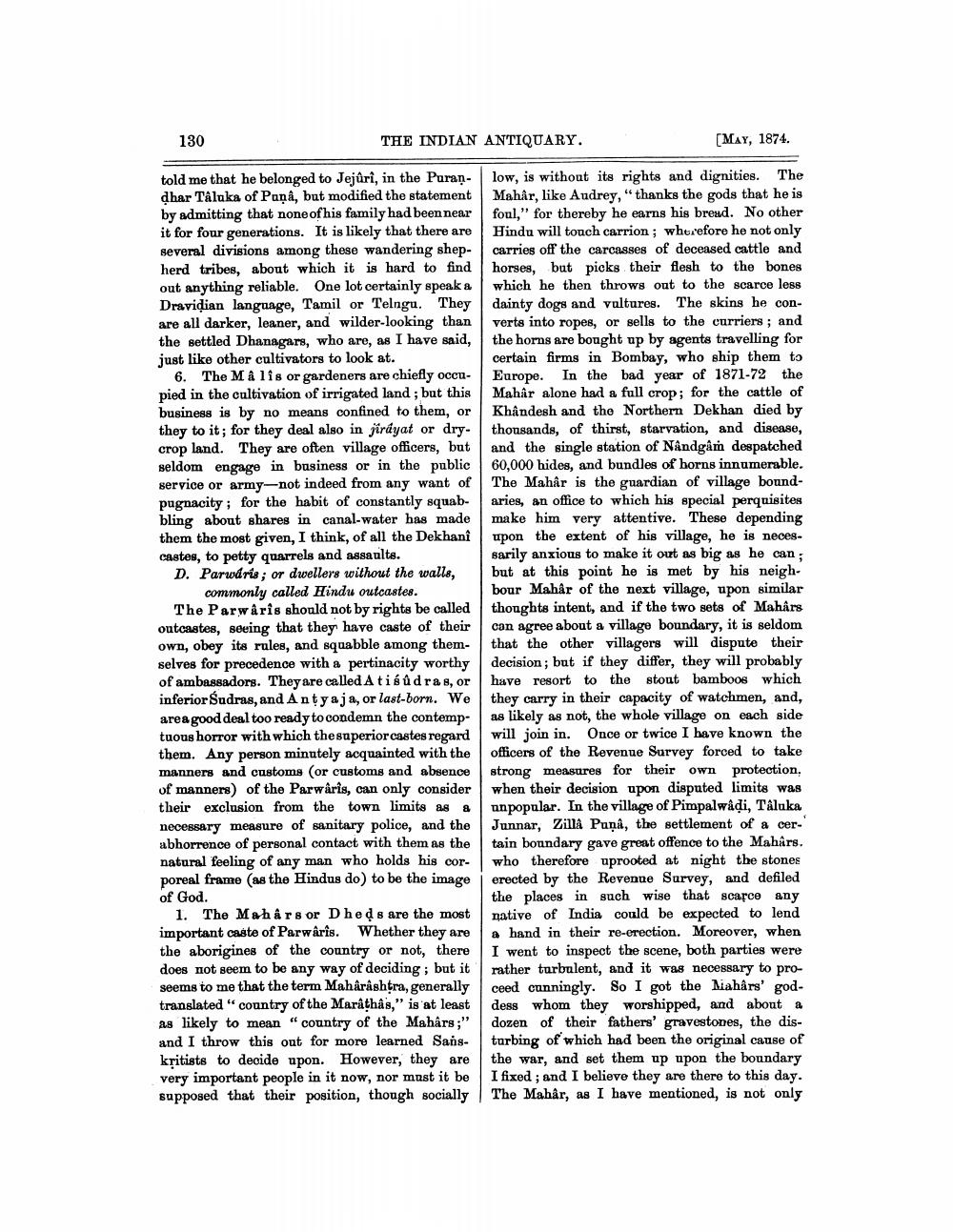________________
130
THE INDIAN ANTIQUARY.
told me that he belonged to Jejûrî, in the Purandhar Taluka of Panâ, but modified the statement by admitting that none of his family had been near it for four generations. It is likely that there are several divisions among these wandering shepherd tribes, about which it is hard to find out anything reliable. One lot certainly speak a Dravidian language, Tamil or Telngu. They are all darker, leaner, and wilder-looking than the settled Dhanagars, who are, as I have said, just like other cultivators to look at.
6. The Mâ lîs or gardeners are chiefly occupied in the cultivation of irrigated land; but this business is by no means confined to them, or they to it; for they deal also in jirayat or drycrop land. They are often village officers, but seldom engage in business or in the public service or army-not indeed from any want of pugnacity; for the habit of constantly squabbling about shares in canal-water has made them the most given, I think, of all the Dekhanî castes, to petty quarrels and assaults.
D. Parwaris; or dwellers without the walls,
commonly called Hindu outcastes.
The Parwâris should not by rights be called outcastes, seeing that they have caste of their own, obey its rules, and squabble among themselves for precedence with a pertinacity worthy of ambassadors. They are called A tisûdras, or inferior Sudras, and Anty aja, or last-born. We area good deal too ready to condemn the contemptuous horror with which the superior castes regard them. Any person minutely acquainted with the manners and customs (or customs and absence of manners) of the Parwârîs, can only consider their exclusion from the town limits as a necessary measure of sanitary police, and the abhorrence of personal contact with them as the natural feeling of any man who holds his corporeal frame (as the Hindus do) to be the image of God.
[MAY, 1874.
low, is without its rights and dignities. The Mahar, like Audrey, "thanks the gods that he is foul," for thereby he earns his bread. No other Hindu will touch carrion; wherefore he not only carries off the carcasses of deceased cattle and horses, but picks their flesh to the bones which he then throws out to the scarce less
1. The Mahars or Dheḍs are the most important caste of Parwârîs. Whether they are the aborigines of the country or not, there does not seem to be any way of deciding; but it seems to me that the term Maharashtra, generally translated" country of the Marâthâs," is at least as likely to mean "country of the Mahârs;" and I throw this out for more learned Sanskritists to decide upon. However, they are very important people in it now, nor must it be supposed that their position, though socially
dainty dogs and vultures. The skins he converts into ropes, or sells to the curriers; and the horns are bought up by agents travelling for certain firms in Bombay, who ship them to Europe. In the bad year of 1871-72 the Mahâr alone had a full crop; for the cattle of Khandesh and the Northern Dekhan died by thousands, of thirst, starvation, and disease, and the single station of Nândgâm despatched 60,000 hides, and bundles of horns innumerable. The Mahâr is the guardian of village boundaries, an office to which his special perquisites make him very attentive. These depending upon the extent of his village, he is necessarily anxious to make it out as big as he can; but at this point he is met by his neighbour Mahar of the next village, upon similar thoughts intent, and if the two sets of Mahars can agree about a village boundary, it is seldom that the other villagers will dispute their decision; but if they differ, they will probably have resort to the stout bamboos which they carry in their capacity of watchmen, and, as likely as not, the whole village on each side will join in. Once or twice I have known the officers of the Revenue Survey forced to take strong measures for their own protection, when their decision upon disputed limits was unpopular. In the village of Pimpalwadi, Tâluka Junnar, Zilla Punâ, the settlement of a certain boundary gave great offence to the Mahârs. who therefore uprooted at night the stones erected by the Revenue Survey, and defiled the places in such wise that scarce any native of India could be expected to lend a hand in their re-erection. Moreover, when I went to inspect the scene, both parties were rather turbulent, and it was necessary to proceed cunningly. So I got the Mahârs' goddess whom they worshipped, and about a dozen of their fathers' gravestones, the disturbing of which had been the original cause of the war, and set them up upon the boundary I fixed; and I believe they are there to this day. The Mahar, as I have mentioned, is not only




